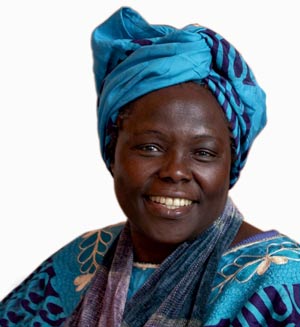Dr. Wangari Maathai

Wangari Maathai. Source: Interview with Wangari Maathai.
Her name may be familiar to you. As a winner of the 2004 Nobel Peace Prize, Dr. Wangari Maathai is making a significant impact not only in her homeland of Kenya but internationally.
Wangari Muta Maathai was born in Nyeri, Kenya, East Africa in 1940. The first woman in East and Central Africa to earn a doctorate degree, Prof. Maathai obtained a Bachelor of Science (B.S.) in Biology from Mount St. Scholastica College in Atchison, Kansas, USA (1964), a Master of Science (M.S.) in Biological Sciences from the University of Pittsburgh, USA (1966), and pursued doctoral studies in Germany and the University of Nairobi before obtaining her Ph.D. in Anatomy in 1971 from the University of Nairobi. In 1976, she became Chair of the Department of Veterinary Anatomy, and, a year later, Associate Professor in the Department of Veterinary Anatomy, both at the University of Nairobi—the first woman in the region to attain those positions.
Prof. Maathai was active in the National Council of Women of Kenya (NCWK) from 1976 to 1987 and was its chairperson from 1981 to 1987. It was in 1976, while serving in the NCWK, that she introduced the idea of planting trees using ordinary people. She continued to develop the idea into a broad-based, grassroots organization called the Green Belt Movement (GBM), launched in 1977. GBM’s main activity involved women’s groups planting trees to conserve the environment and empower themselves by improving their quality of life. Through GBM, Wangari Maathai has helped women plant more than 30 million trees on their farms and in school and church compounds across Kenya.
In 1986, GBM established a Pan-African Green Belt Network. Over the years GBM has exposed a number of people from African countries to its community empowerment and conservation approach. As a result of GBM sharing its experiences and its belief in grassroots participatory methods to solve local challenges, a number of individuals have established GBM-like tree-planting initiatives in their own countries, or have used some of GBM’s methods to improve their programs. To date, initiatives have been successfully launched in Tanzania, Uganda, Malawi, Lesotho, Ethiopia and Zimbabwe, among others.
In September 1998, Prof. Maathai launched a campaign formed out of the Jubilee 2000 Coalition. She played a leading global role as co-chair of the Jubilee 2000 Africa Campaign, which advocates for canceling the backlogged, non-repayable debts of poor African countries. Recently, her campaign against “land grabbing” (illegal appropriation of public lands by unscrupulous developers) and the rapacious “re-allocation” of forest land has received much attention in Kenya and the region.
In December 2002, Prof. Maathai was elected to Kenya’s parliament with an overwhelming 98 percent of the vote. She now represents the Tetu constituency, Nyeri district in central Kenya (her home region). Subsequently, in January 2003, President Mwai Kibaki appointed her Assistant Minister for Environment and Natural Resources in Kenya’s ninth parliament, a position she currently holds.
Wangari Maathai is internationally recognized for her persistent struggle for democracy, human rights and environmental conservation. She has addressed the United Nations on several occasions and spoke on behalf of women at special sessions of the General Assembly for the five-year review of the 1992 Earth Summit. She served on the Commission for Global Governance and the Commission on the Future.
Over the years, she and the Green Belt Movement have received numerous awards, most notably the 2004 Nobel Peace Prize.